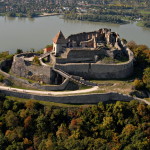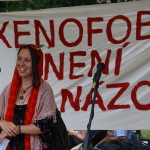The Czech Republic, now at the helm of the V4, faces difficulties concerning the migrant crisis and the Nord Stream II
The Visegrad Group in 2016 will celebrate the 25th anniversary of its foundation
The presidency of the Visegrad Group, which began last July and ends in mid-2016, is proving to be full of obstacles and pitfalls for the Czech Republic both regarding Europe, and in the relationship within the partnership between Prague, Bratislava, Budapest and Warsaw.
On the one hand there is the refugee crisis, regarding which Visegrad has proved to be united, although with varying degrees of ostracism, and on the other there is the energy issue on which, however, Slovakia, Czech Republic, Poland and Hungary no longer share a common position, in particular on the development of Nord Stream on which Prague is sandwiched between the interests of good neighbourly relations with Berlin and their partners in the V4.
 We remember that the Group was born on 15 February 1991 during a summit involving the heads of state and of the governments of Czechoslovakia, Hungary and Poland. The association became one of four nations on 1 January 1993, with the birth of the Czech Republic and Slovakia.
We remember that the Group was born on 15 February 1991 during a summit involving the heads of state and of the governments of Czechoslovakia, Hungary and Poland. The association became one of four nations on 1 January 1993, with the birth of the Czech Republic and Slovakia.
The name of the alliance derives from a symbolic episode in the history of medieval central Europe: a meeting between the kings Charles I of Hungary, Casimir III of Poland and John I of Bohemia took place in 1335 in the Hungarian city of Visegrad. Charles I of Hungary and the Czech King John I agreed on the need to create new trade routes that avoided the centre of Vienna and to get faster access to the various European markets.
In 2016, the V4 will celebrate the 25th anniversary of its foundation. Nowadays, the Czech Presidency has to deal with a very different geo-political map since the Group was created, starting from the fact that back then the need was greater to collaborate to enter the path of access to EU membership, while now all four states are already members of the Union.
However, in essence, what is Prague required to deal with until 30 June 2016? Firstly, it is trying try to influence Visegrad’s stance towards the EU. Not a simple task, given that lately, especially concerning migrants, Budapest and Bratislava have openly broken away from Brussels and with its plan for redistributing refugees.
Finally, on the same subject, and of no less importance, a letter signed by all V4 members which warns the European Union from any “attempt, whether evident or hidden, to limit the freedom of movement”, within a mini-Schengen area, an idea dreaded by Holland, the next EU presidency.
Slovakia, the Czech Republic, Hungary and Poland, “will have a discussion with the other Member States, and will try to convince them to leave the idea of Schengen alive without letting it crumble into a mini-Schengen, ensuring the functioning of the external borders”, said the Czech prime minister Bohuslav Sobotka.
Their position is shareable and shared by many in the EU, but Prague is facing discontent in the Visegrad Group, not hidden at all, regarding the solidarity system of refugee quotas. While Poland does not intend to accept a large number of migrants, Budapest has totally closed its borders, even to the transit of migrants headed towards northern Europe, causing a cascade in emergency migration in the Western Balkans.
The Nord Stream II and the energy issue
Another much-discussed issue, perhaps even more difficult to unravel, especially since in this case Prague finds itself in an awkward position compared to the V4, is energy. “The priority of the Czech Presidency is the execution of the Energy Union project”, and then the “cooperation with third countries and the internal gas market”, it said on the page of the Presidency, which stresses the importance of collaborating with Germany and Austria for a common network for electricity. The sore spot, however, is the strategy for energy independence regarding gas, in particular towards the North Stream.
A letter, signed by the Baltic, Hungary, Poland and Slovakia, referred to the project as contrary to the common interests, because “the transit countries in Eastern Europe, with connection systems with Ukraine, would lose their current position” and there would be the “risk of deterioration of infrastructure” in Hungary, Romania, Slovakia and Ukraine because the Nord Stream II would bypass their pipelines. Finally, the signatories stated that the project “would help to undermine the security of the supply” that would depend “almost entirely on imported Russian gas” entering from Germany.
The rupture related to this took place at the beginning of December with Prague’s decision not to sign a letter promoted by the Slovak Ministry of Economy. Bratislava, in fact, would be the most affected of them by the creation of a gas pipeline such as the Nord Stream II. According to Slovak Minister of Economy Vazil Hudák loss for the government would be around 400 million euro per year for transit. The damage would be even worse for Ukraine, estimated at about two billion euros a year. Poland too, wants to strongly block the plans of Gazprom and E.ON. According to the conservative Polish President Andrzej Duda building a pipeline that will link Russia and Germany passing under the Baltic Sea, “must be stopped” and “we will do everything possible to stop it” because “everyone who has an inkling of the geopolitical situation, knows that it’s not purely business, it also has considerable political importance”. Duda and the Polish right fear, more than anything, that Russian President Vladimir Putin will regain, through the energy project, the trust of Western leaders which has been sorely tested by the Ukrainian crisis.
The Czech Minister of Industry and Trade Jan Mládek explained the decision not to countersign the letter of the partners addressed to the European Commission stating that the North Stream II may be beneficial to the country. “We think it could lead to an expansion for other pipelines such as Opal and the Gazela because the Germans need pipeline transit not only to the Baltic countries, but also to Bavaria where there is the highest consumption. And the line of transit crosses the Czech Republic”.
Searching for a difficult compromise
Prague is trying hard to please its main trading partner, Germany, precisely, however, without slamming the door on their V4 allies. The declaration of compromise made by Mládek a few days later exemplifies how much diplomatic work Prague will have to do in the coming months: “We undoubtedly support the transit of gas through Ukraine and Slovakia and understand the concerns of these countries should the transit stop”, he declared. “And it would not help the Czech Republic either because we prefer to have two routes of access to Russian gas”, and “keep them both”. At the same time, the minister admitted “it’s hard for us to be totally against the Nord Stream II because it increases the security of our supplies”.
Another chapter to the topic was added by the European Council President and former Polish Prime Minister, Donald Tusk, who, however, will not have the final say on whether or not the pipeline will be done. While speaking at the conclusion of the summit of Heads of State and of Governments of the EU, Tusk said that the North Stream II undermines the strategy of diversification of energy sources of the union, and the rules on transit routes, like the one in Ukraine. The last word on Gazprom’s project of expansion of the pipeline bringing gas from Russia to Germany passing under the Baltic Sea and bypassing Ukraine, is up to the European Commission.
In the background of this difficult diplomatic and energy-related context is the fact the Visegrad Group has just conducted military exercises in Hungary called Balaton 2015. Among the objectives, is to ensure the coordination of the armed forces of the countries of Eastern Europe, for better border surveillance of Schengen borders in response to the refugee emergency.
by Daniela Mogavero








